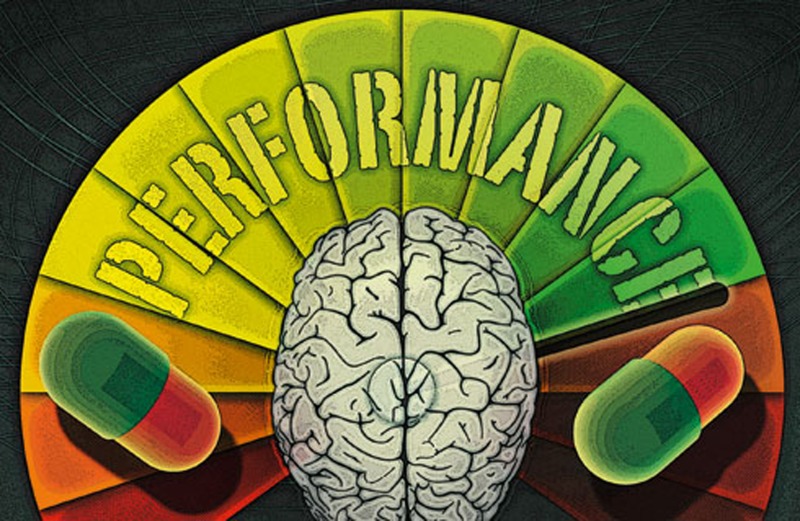An increasing number of opinions and commentaries are being written about the possible benefits and risks of so-called ‘cognitive enhancers’ [1], a term that usually refers to technologies that purportedly augment cognitive performance or modulate mood and behaviour [2]. These discussions have focused on both existing pharmaceuticals, such as prescription medications, and new drugs and technologies that could be developed with the explicit purpose of enhancing cognitive function in healthy individuals [3]. Nearly all of these articles have discussed the ethical, legal and societal implications of using cognitive enhancers and whether the risks in relation to potential benefits would require regulation, oversight or even bans.
Interestingly, some discussions indicate that existing cognitive-enhancement drugs have an effect on healthy individuals and provide clear benefits [1,4,5]. In fact, however, other reviews of the topic [6,7,8,9,10,11] have found insufficient evidence for both the efficacy and safety of most cognitive-enhancing medications in healthy populations. At the same time, calls for further research have been made [12,13], but in a context that is shaped more by a ‘melioristic misconception’, rather than a genuine scientific confirmation of benefit [14,15]. Thus, before discussing bans or regulations, society must address two crucial questions: are these drugs safe and do they work? To answer these in a satisfactory manner would require either drug trial-like studies to ascertain safety and efficacy, or health surveys to monitor for adverse side-effects from taking cognitive enhancers. Inevitably, both would require considerable financial resources for studies of something that is not a health issue per se, but a recreational use at best or an ethically questionable activity at worst.
Not surprisingly, the critics of cognitive enhancement have already argued against the further funding and promotion of research into cognitive enhancers, owing to ethical concerns [16]. However, ethical concerns are only one facet; such research also has possible wide-ranging social and public health consequences. If future studies found cognitive enhancers to be safe and efficient, any bans or regulations would create a black market for these drugs. Given these factors, funding agencies or policy-makers might therefore choose to promote active research on the efficacy of cognitive enhancers, to restrict it or to not address the issue at all.
If future studies found cognitive enhancers to be safe and efficient, any bans or regulations would simply create a black market for these drugs
Discussions in the academic literature [17] about whether it is prudent to conduct research into cognitive enhancers have focused largely on the regulatory and practical aspects of conducting the research, leaving the ethical justification and responsibilities for overseeing it largely unexamined. Closer examination of the questions and implicit ethical assumptions about safety, efficacy and demand [16,18,19] could therefore help to ensure that a future position on cognitive-enhancement research is based on clear scientific and ethical justification.
In this paper, we therefore seek to broaden the debate by analysing the possible positions on cognitive-enhancement research and discussing their strengths and weaknesses with respect to their possible implications. We also identify and discuss three important points that might uncover scientific and ethical assumptions, as well as implicit values. Our focus is restricted to pharmacological research on already approved drugs. We acknowledge that the safety data on the long-term effects of drugs with potential for use as cognitive enhancers is deficient [20] and that establishing safety merits further attention.
Table 1 presents three possible positions on cognitive-enhancement research: promoting research, continuing the current situation, which does not actively address the issue, or prohibiting cognitive-enhancement research. The table also lists arguments in favour of or against a particular position. These are inevitably fluent—in some cases, a particular argument would support one position but weaken another. In any case, each position demonstrates that the way in which cognitive-enhancement research might or might not develop requires considerations beyond merely gathering data on efficacy.
Table 1. Three stances on research on the efficacy of medications used for cognitive enhancement of healthy individuals.
| Aspect | Promote research on the efficacy of cognitive enhancers | Neither promote nor restrict research on cognitive enhancers | Prevent research on the efficacy of cognitive enhancers |
|---|---|---|---|
| Rationale | Expected benefits of cognitive enhancers justify pharmacological research on cognitive enhancement. | Cognitive enhancement is not a serious public health issue and research neither promises to yield benefits nor poses distinct research ethics issues. | Research on cognitive enhancers raises significant ethical and social challenges and should be restricted as a precautionary measure. |
| Strengths | Allows pursuit of knowledge to discover whether medications produce enhancement to dispel speculation about efficacy. Provides an evidence base for decisions about cognitive enhancement in academic, professional, public health and medical contexts. | Cognitive-enhancement research is allowed on case-by-case funding and standard ethics review without change to policies. Fosters an incremental acceptance or rejection of cognitive-enhancement research without the consequences of drastic changes in research policy. | Curtails discussion of difficult ethical issues by preventing the collection of efficacy data. Redirects research efforts to more ‘legitimate’ needs in health or patient-oriented research. |
| Weaknesses | Research to establish efficacy and risks might have low research priority given more important health needs and lack of support from strong epidemiological data. Research on cognitive enhancers could inadvertently promote such use by creating a ‘melioristic misconception’ by publishing early results. Research ethics challenges created by research on the healthy—for example, equipoise, benefit-to-risk calculus—must be tackled. | Case-by-case approach can leave aside the ‘bigger picture’ issues created by research on cognitive enhancement—for example, equipoise, benefit-to-risk calculus—and social outcomes of research. Creates regulatory loopholes and variable decisions because of the lack of attention to cognitive-enhancement research as a category. | Prevents research and thus choices and decisions based on evidence. Might overestimate the ability to curtail the use of cognitive enhancers—for example, black markets. Might stigmatize therapeutic uses of these drugs. Might foster ‘disease mongering’ if research is reframed as therapeutic or clinical research based on expanded diagnostic categories. |
One major caveat in discussing these positions and their relative value is that the possible outcomes and impacts of promoting or restricting research on the efficacy of cognitive enhancers are largely speculative. First, the terms ‘cognitive enhancement’ and ‘cognitive enhancers’ imply the very efficacy that research still needs to confirm or refute. This language is equivalent to claims of therapeutic efficacy describing unproven and invalidated interventions, such as stem cell ‘therapy’ for stem cell injections and gene ‘therapy’ for somatic cell nuclear transfer. Second, the standard definition of cognitive ‘enhancement’ as the opposite of ‘treatment’ is ambiguous [21]. The scope of what comprises cognitive-enhancement is still a subject of debate, with more expansive classifications encompassing education and computer technologies [1]. Third, given the ambiguity and lack of clarity in vocabulary, it is possible that the aims and goals of cognitive enhancement research are similarly unclear. For example, which aspects of cognition—attention, alertness and memory—are to be enhanced, to what extent and by what means? Finally, the term ‘cognitive enhancement’ lends itself to confusion with existing treatments for individuals with depression, schizophrenia and dementia that could also be repurposed to enhance mental capacities in healthy individuals. A similar ambiguity can arise if the ‘restoration’ of cognitive abilities, for example memory in ageing,is also considered a cognitive enhancement [22].
…the possible outcomes and impacts of promoting or restricting research on the efficacy of cognitive enhancers are largely speculative
In addition to these uncertainties and unclear definition, these positions also make assumptions that might influence predictions about outcomes and impacts. For example, promoting research takes for granted that having access to more information is of neutral value, whereas the opposing stance assumes that any information showing efficacy of cognitive enhancers in healthy individuals probably leads to a change in social practices. A neutral position might assume that there are meaningful methods for studying the enhancement effects of medications and that research ethics frameworks are well equipped to review and oversee enhancement research.
Three key issues inform the arguments that support the different positions on cognitive-enhancement research: the nature of ‘demand’ and how it relates to the notion of ‘prevalence’; the responsibility of stakeholders in requesting and conducting ethical cognitive-enhancement research; and the social outcomes of cognitive-enhancement research.
The positions summarized in Table 1, similarly to the overall debate on cognitive enhancement, have identified high estimates of prevalence as a possible justification to promote or restrict research. Demand is often equated to prevalence [1], but this equation is at best an approximation and, at worst, misleading. First, prevalence data have been criticized [18,23] for lack of shared methodology and for capturing broader uses that include experimentation and recreation, often in selected populations such as high-school and university students [24,25]. Second, the causes underlying the use of cognitive enhancement do not necessarily become demands unless prevalence is regarded as a motive for using medications this way. However, prevalence is a measure of the distribution of a practice, but not of the greater desire for such drugs. Further, it is problematic to assume that public demand for cognitive enhancers is the same as a demand for research on the efficacy of cognitive enhancers.
Demand is often equated to prevalence, but this equation is at best an approximation and, at worst, misleading
Even so, some authors believe that cognitive enhancement is inevitable and will probably become widespread given prevalence data [1,3]. Within this perspective, the demand for research is based on at least three major related, but distinct, arguments: cognitive-enhancement research would respond to the prevalence of non-medical use of medications with efficacy data, it would foster more informed ethical decision-making and regulation, and it could lead to the development of preventative measures if cognitive enhancement proved harmful or ineffective. The first argument is based on prevalence rates from studies of the use of stimulants on university campuses [26,27]. Often cited in support is a methodologically debatable poll published in Nature, which has been misinterpreted as evidence that the non-medical use of medications for cognitive enhancement is already widespread and a public health concern [1,28]. Such perception of widespread demand would support the need for protecting the current and future health of individuals who seek cognitive enhancement [29].
The second argument stipulates that information on efficacy is needed to promote informed
ethical decision-making by individuals, organizations and society. Regardless of the findings
about efficacy, research would yield important information for policy and regulation
[12]. The guidance issued by the American Academy of
Neurology already addresses concerns about the possible long-term effects of cognitive
enhancement by healthy individuals [30].
The third argument captures the fear that cognitive enhancement will become widespread, and that research is justified to prevent a potential public health issue. Collecting data on prevalence of use and, separately, on demand, is an important precursor to researching the efficacy of cognitive enhancers and responding to current practices [20]. However, estimating demand for cognitive-enhancement research is a multifaceted task involving complex challenges of determining who actually demands cognitive enhancement and why [31].
The research process involves many steps and stakeholders: funding bodies, researchers and pharmaceutical companies, government and research ethics committees and clinicians. It is less obvious how the different ethical frameworks of these stakeholders would be integrated to support a specific position on cognitive-enhancement research. Surely, to be ethically justified, such research must be scientifically meaningful and generate sound results, hopefully in connection with requests for further evidence. Accordingly, research must be planned in a way that clearly and transparently establishes that the study focuses on enhancement, quantitatively or qualitatively, and is plausibly linked to real-world performance.
…it is problematic to assume that public demand for cognitive enhancers is the same as a demand for research on the efficacy of cognitive enhancers
As long as people believe that medications have some kind of enhancing effect, and as long as said drugs are only available on prescription, the medical profession will have primary responsibility for their use. Studies have shown that physicians receive some requests for cognitive enhancement and that they have serious concerns about harm-to-benefit ratios and equality issues [32,33,34]. Further research is only beginning to gauge whether and how enhancement is discussed among clinicians [32]. What constitutes a proper use, in terms of cognitive enhancement, is largely within the judgement of a clinician [4]. However, some authors have expressed concern about whether physicians can adequately assess harm-to-benefit ratios and maintain their duty to the patient without better evidence, and whether medicine is acquiescing too readily to social expectations for enhanced performance [35,36]. Therefore, research on cognitive enhancement would be useful to clinical practice.
Funding decisions about research projects are typically made through a combination of open, bottom-up investigator-initiated competitions or through strategic, top-down funding in specific areas identified as priorities. Funding for cognitive-enhancement research seems to come from general research funding mechanisms. Only a few funding programmes specifically support enhancement research. The US Defense Advanced Research Projects Agency established an ‘augmented cognition’ programme to investigate a range of enhancement technologies, some of which are of military interest [37]. Elsewhere, cognitive-enhancement research would be competing with other priorities for strategic funding. Some authors condemn “the use of scarce resources to carry out this research” [16], but as more is learned about the demand for cognitive enhancement, funding agencies might be more inclined to allocate funding. Also, cognitive enhancement research could be funded because it promises to increase economic prosperity in ageing nations with struggling economies to augment their ‘mental wealth’ [38]. This more societal perspective could eventually conflict with the primary responsibilities of clinicians to their patients.
What constitutes a proper use, in terms of cognitive enhancement, is largely within the judgement of a clinician
For researchers in both the private and public sectors, the rationale and objectives of cognitive-enhancement research should be clearly stated so that it is not covered as the control arm or a preliminary phase of a clinical study. It would ensure a proper review of the quality of the scientific goals and their ethical and funding merits. Pharmaceutical companies are also important in initiating and funding cognitive-enhancement research. However, the motivations of privately funded research are different and can be subject to criticism, especially if their intentions could be criticized as ‘disease-mongering’ [39]. Also, such activity might conflict with the responsibilities of healthcare systems to serve patients who need treatment.
It is not clear how those involved in the informal and formal oversight of research and publication generally consider the ethical and scientific value of research. Research ethics committees and regulatory bodies that approve substances would potentially be partly responsible for this assessment. However, research and regulatory guidelines do not provide specific guidance on enhancement research or non-medical uses of medication. For example, the report of the Presidential Commission for the Study of Biomedical Issues [40] provides limited insights into how to deal with enhancement research in the USA. In Canada, the revised research ethics guidelines—the Tri-Council Policy Statement—also do not discuss this scenario [41]. Cognitive-enhancement research could be better regulated if clear thresholds for efficacy were established, as illustrated by meta-analyses on anti-depressant clinical trials [42].
The positions summarized in Table 1 differ with respect to the social outcomes of cognitive-enhancement research. Improved knowledge about the efficacy of cognitive enhancement might be considered of neutral value because it potentially informs positions both in favour of and against the use of cognitive enhancement. The knowledge sought and generated can also have consequences for science, regulation and social practices. It is, therefore, important to ask not only what type of research should be done, but also to understand why it is justified (or not) from a broader social point of view.
Those who favour cognitive enhancement have often cited potential benefits to society to support their arguments [5,43]. This argument takes for granted that cognitive-enhancement studies will necessarily unveil beneficial effects; however, harms are also a possible finding, given previous experience with therapeutic drugs. Furthermore, precisely what is meant by social benefits or social harms is often unclear. Some claim increased productivity and intelligence—cognitive benefits to individuals would therefore benefit society at large by making them more productive [44,45]. On the contrary, changes in productivity might be considered a significant social harm, especially given the potential for abuse in an international context [8,19]. The effects of cognitive enhancers on individual productivity and intelligence have yet to be demonstrated, much less the contribution that enhanced individuals could make to overall social well-being.
If we are to promote, prohibit or remain neutral towards cognitive-enhancement research based on […] its social benefits or harms, we must evaluate what this means beyond ‘having a better life’
If we are to promote, prohibit or remain neutral towards cognitive enhancement research based on, at least in part, its social benefits or harms, we must evaluate what this means beyond ‘having a better life’ [46]. How might improved concentration translate into social benefits? How might the social benefits and drawbacks of cognitive enhancement be assessed? Whom should we assess in this context? A review of national and international research ethics guidelines revealed contradictory views on whether and how social outcomes and consequences of research are considered within or outside the purview of conventional research ethics [47]. For example, the International Conference on Harmonisation, Good Clinical Practice, states that “The IRB [Institutional Review Board] should not consider possible long-range effects of applying knowledge gained in the research (for example, the possible effects of the research on public policy) as among those research risks that fall within the purview of its responsibility.” The Declaration of Helsinki, by contrast, suggests an assessment of“foreseeable benefits to the subject or to others”.
Various options have been proposed for ethical assessment of the social outcomes of research: expanding the research ethics mandate, resisting expanding the research ethics mandate and adopting the status quo, and opting for new alternative peer and community review strategies [47]. In traditional health care, quality-adjusted life years and disability-adjusted life years are used to measure the impact of treatments. Could equivalent measures be developed for enhancement research? Current mechanisms for oversight are clearly not capable of capturing and addressing possible future social outcomes of research. One approach is to involve stakeholders in deliberations about the most appropriate approach to the social outcomes of cognitive-enhancement research [48]. A more modest proposal, given the difficulties in predicting long-term social outcomes, might lie in monitoring these consequences through different measures and approaches, such as ongoing surveillance of prevalence, adverse social effects and the motivations of cognitive-enhancement users.
In this discussion, our goal is to characterize and analyse, from an ethics standpoint, the different positions towards research on cognitive enhancement in a context in which the debate is opening to this question. Although we do not intend at this stage to make specific recommendations, we do feel as a group that restricting research is difficult given the compelling need for better data on prevalence, safety and efficacy. Regardless of the position adopted, an explicit and transparent acknowledgement of the goals of cognitive-enhancement research should be communicated throughout the research process. We hope our contribution brings greater awareness of the choices available to the scientific community and emphasizes the need for a culturally sensitive, international discussion about the direction of cognitive-enhancement research that is representative of the best scientific methods and takes due account of pluralist perspectives.

Cynthia Forlini

Eric Racine

Wayne Hall

Bruce Maxwell

Simon M Outram

Peter B Reiner

Maartje Schermer
Acknowledgments
This article is based on discussions that took place during a one-day interdisciplinary and international workshop at the Institut de recherches cliniques de Montréal in May 2011. Participants were invited according to their backgrounds in biomedical and research ethics, neuroscience, philosophy, public health policy and epidemiology, as well as their interest in intellectual reflection on ethical issues in research on cognitive enhancement. The first and final authors (C.F. and E.R.) synthesized the contributions and wrote an initial draft of the article. The article was sent out to participants who could opt in or out of the writing process, which allowed co-authors to add to their contribution made during the workshop. We sought approval of the final draft from all co-authors to make sure that the content reflected the thoughts of the group. We thank Françoise Baylis for her participation in the workshop and her feedback on a previous version of this manuscript, and Irving Kirsch for his participation in the workshop. The authors acknowledge the support of the Social Sciences and Humanities Research Council of Canada (E.R.), the Fonds de Recherche en Santé du Québec (C.F. and E.R.), the Canadian Institutes of Health Research (S.M.O. and P.B.R.), the National Health and Medical Research Council of Australia, Australia Fellowship (W.H.), the Netherlands Organization for Health Research and Development (M.S.) and the Volkswagen Foundation (D.R.). Thanks to members of the Neuroethics Research Unit for helpful comments on a previous version of this article and to Catherine Rodrigue for her assistance with transcription.
Footnotes
The authors declare that they have no conflict of interest.
References
- Greely H, Sahakian B, Harris J, Kessler RC, Gazzaniga M, Campbell P, Farah MJ (2008) Towards responsible use of cognitive-enhancing drugs by the healthy. Nature 456: 702–705 [DOI] [PubMed] [Google Scholar]
- Hall W (2004) Feeling ‘better than well’. EMBO Rep 5: 1105–1109 [DOI] [PMC free article] [PubMed] [Google Scholar]
- Farah MJ, Illes J, Cook-Deegan R, Gardner H, Kandel E, King P, Parens E, Sahakian B, Wolpe PR (2004) Neurocognitive enhancement: what can we do and what should we do? Nat Rev Neurosci 5: 421–425 [DOI] [PubMed] [Google Scholar]
- Larriviere D et al. (2009) Responding to requests from adult patients for neuroenhancements: guidance of the Ethics, Law and Humanities Committee. Neurology 73: 1406–1412 [DOI] [PMC free article] [PubMed] [Google Scholar]
- Bostrom N, Sandberg A (2009) Cognitive enhancement: methods, ethics, regulatory challenges. Sci Eng Ethics 15: 311–341 [DOI] [PubMed] [Google Scholar]
- Repantis D, Laisney O, Heuser I (2010) Acetylcholinesterase inhibitors and memantine for neuroenhancement in healthy individuals: a systematic review. Pharmacol Res 61: 473–481 [DOI] [PubMed] [Google Scholar]
- Repantis D, Schlattmann P, Laisney O, Heuser I (2008) Antidepressants for neuroenhancement in healthy individuals: a systematic review. Poiesis Prax 6: 139–174 [Google Scholar]
- Repantis D Schlattmann P, Laisney O, Heuser I (2010) Modafinil and methylphenidate for neuroenhancement in healthy individuals: a systematic review. Pharmacol Res 62: 187–206 [DOI] [PubMed] [Google Scholar]
- de Jongh R, Bolt I, Schermer M, Olivier B (2008) Botox for the brain: enhancement of cognition, mood and pro-social behavior and blunting of unwanted memories. Neurosci Biobehav Rev 32: 760–776 [DOI] [PubMed] [Google Scholar]
- Husain M, Mehta MA (2011) Cognitive enhancement by drugs in health and disease. Trends Cogn Sci 15: 28–36 [DOI] [PMC free article] [PubMed] [Google Scholar]
- Lynch G, Palmer LC, Gall CM (2011) The likelihood of cognitive enhancement. Pharmacol Biochem Behav 99: 116–129 [DOI] [PMC free article] [PubMed] [Google Scholar]
- Mohamed AD, Sahakian BJ (2011) The ethics of elective psychopharmacology. Int J Neuropsychopharmacol 15: 559–571 [DOI] [PMC free article] [PubMed] [Google Scholar]
- Smith EM, Farah MJ (2011) Are prescription stimulants “smart pills”? The epidemiology and cognitive neuroscience of prescription stimulant use by normal healthy individuals. Psychol Bull 137: 717–741 [DOI] [PMC free article] [PubMed] [Google Scholar]
- Forlini C, Racine E (2009) Disagreements with implications: diverging discourses on the ethics of non-medical use of methylphenidate for performance enhancement. BMC Med Ethics 10: 9. [DOI] [PMC free article] [PubMed] [Google Scholar]
- Partridge BJ et al. (2011) Smart drugs “as common as coffee”: media hype about neuroenhancement. PLoS ONE 6: e28416. [DOI] [PMC free article] [PubMed] [Google Scholar]
- Heinz A, Kipke R, Heimann H, Wiesing U (2012) Cognitive neuroenhancement: false assumptions in the ethical debate. J Med Ethics 38: 325–326 [DOI] [PubMed] [Google Scholar]
- Mehlman MJ, Berg JW, Juengst ET, Kodish E (2011) Ethical and legal issues in enhancement research on human subjects. Camb Q Healthc Ethics 20: 30–45 [DOI] [PubMed] [Google Scholar]
- Lucke JC, Bell S, Partridge B, Hall WD (2010) Weak evidence for large claims contribute to the phantom debate. BioSocieties 5: 482–483 [Google Scholar]
- Racine E, Forlini C (2009) Expectations regarding cognitive enhancement create substantial challenges. J Med Ethics 35: 469–470 [DOI] [PubMed] [Google Scholar]
- Commission de l'éthique de la science et de la technologie (2009) Position Statement on Psychotropic Drugs and Expanded Uses: An Ethical Perspective. Québec, Canada: Commission de l'éthique de la science et de la technologie [Google Scholar]
- Juengst E (1998) What does enhancement mean? In Enhancing Human Traits: Ethical and Social Implications (ed Parens E), pp 29–47. Washington, DC, USA: Georgetown University Press [Google Scholar]
- Reiner PB (2010) Distinguishing between restoration and enhancement in neuropharmacology. Virtual Mentor 12: 885–888 [DOI] [PubMed] [Google Scholar]
- Outram SM (2010) The use of methylphenidate among students: the future of enhancement? J Med Ethics 36: 198–202 [DOI] [PubMed] [Google Scholar]
- Teter CJ, McCabe SE, Boyd CJ, Guthrie SK (2003) Illicit methylphenidate use in an undergraduate student sample: prevalence and risk factors. Pharmacotherapy 23: 609–617 [DOI] [PubMed] [Google Scholar]
- Teter CJ, McCabe SE, Cranford JA, Boyd CJ, Guthrie SK (2005) Prevalence and motives for illicit use of prescription stimulants in an undergraduate student sample. J Am Coll Health 53: 253–262 [DOI] [PubMed] [Google Scholar]
- Arria AM, DuPont RL (2010) Nonmedical prescription stimulant use among college students: why we need to do something and what we need to do. J Addict Dis 29: 417–426 [DOI] [PMC free article] [PubMed] [Google Scholar]
- Farah MJ (2011) Overcorrecting the neuroenhancement discussion. Addiction 106: 1190–1191 [DOI] [PubMed] [Google Scholar]
- Maher B (2008) Poll results: look who's doping. Nature 452: 674–675 [DOI] [PubMed] [Google Scholar]
- Singh I, Kelleher KJ (2010) Neuroenhancement in young people: proposal for research, policy, and clinical management. AJOB Neurosci 1: 3–1622247810 [Google Scholar]
- Larriviere D, Williams MA (2010) Neuroenhancement: wisdom of the masses or “false phronesis”? Clin Pharmacol Ther 88: 459–461 [DOI] [PubMed] [Google Scholar]
- Outram SM, Racine E (2011) Developing public health approaches to cognitive enhancement: an analysis of current reports. Public Health Ethics 4: 93–105 [Google Scholar]
- Banjo OC, Nadler R, Reiner PB (2010) Physician attitudes towards pharmacological cognitive enhancement: safety concerns are paramount. PLoS ONE 5: e14322. [DOI] [PMC free article] [PubMed] [Google Scholar]
- Bergström LS, Lynoe N (2008) Enhancing concentration, mood and memory in healthy individuals: an empirical study of attitudes among general practitioners and the general population. Scand J Public Health 36: 532–537 [DOI] [PubMed] [Google Scholar]
- Hotze T, Shah K, Anderson EE, Wynia MK (2011) “Doctor, would you prescribe a pill to help me…?” A national survey of physicians on using medicine for human enhancement. Am J Bioethics 11: 3–13 [DOI] [PubMed] [Google Scholar]
- Boot BP, Partridge B, Hall W (2012) Better evidence for safety and efficacy is needed before neurologists prescribe drugs for neuroenhancement to healthy people. Neurocase 18: 181–184 [DOI] [PubMed] [Google Scholar]
- Racine E, Forlini C (2010) Responding to requests from adult patients for neuroenhancements: guidance of the ethics, law and humanities committee. Neurology 74: 1555–1556 [DOI] [PubMed] [Google Scholar]
- Moreno JD (2004) DARPA on your mind. Cerebrum 6: 91–99 [PubMed] [Google Scholar]
- Kirkwood T, Bond J, May C, McKeith I, Teh M (2008) Foresight Mental Capital and Wellbeing Project. London, UK: The Government Office for Science [Google Scholar]
- Moynihan R, Heath I, Henry D (2002) Selling sickness: the pharmaceutical industry and disease mongering. BMJ 324: 886–891 [DOI] [PMC free article] [PubMed] [Google Scholar]
- President's Commission for the Study of Biomedical Issues (2011) Moral Science: Protecting Participants in Human Subjects Research. Washington DC, USA: President's Commission for the Study of Biomedical Issues [Google Scholar]
- Canadian Institutes of Health Research, National Science and Engineering Research Council of Canada, Social Sciences and Humanities Research Council of Canada (2010) Tri-Council Policy Statement: ethical conduct for research involving humans. http://www.pre.ethics.gc.ca/pdf/eng/tcps2/TCPS_2_FINAL_Web.pdf [Google Scholar]
- Kirsch I, Deacon BJ, Huedo-Medina TB, Scoboria A, Moore TJ, Johnson BT (2008) Initial severity and antidepressant benefits: a meta-analysis of data submitted to the Food and Drug Administration. PLoS Med 5: e45. [DOI] [PMC free article] [PubMed] [Google Scholar]
- Sandberg A, Bostrom N (2006) Converging cognitive enhancements. Ann NY Acad Sci 1093: 201–227 [DOI] [PubMed] [Google Scholar]
- Beddington J et al. (2008) The mental wealth of nations. Nature 455: 1057–1060 [DOI] [PubMed] [Google Scholar]
- Savulescu J (2006) Justice, fairness, and enhancement. Ann NY Acad Sci 1093: 321–338 [DOI] [PubMed] [Google Scholar]
- Schermer M, Bolt I, de Jongh R, Olivier B (2009) The future of psychopharmacological enhancement: expectations and policies. Neuroethics 2: 75–87 [Google Scholar]
- Zimmerman E, Racine E (2012) Ethical issues in the translation of social neuroscience: a policy analysis of current guidelines for public dialogue in human research. Account Res 19: 27–46 [DOI] [PubMed] [Google Scholar]
- Nadler R, Reiner PB (2010) A call for data to inform discussion on cognitive enhancement. BioSocieties 5: 481–482 [Google Scholar]


